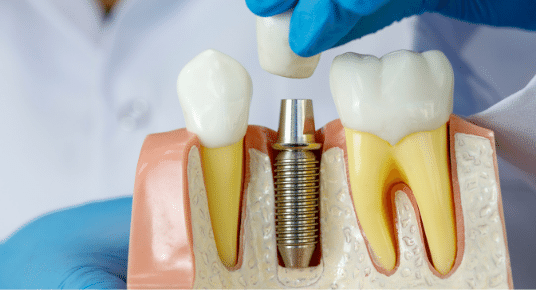What are dental implants used for?
By being fixed into the jawbone, the implants provide stable support for the artificial teeth. Implant-mounted dentures and dental bridges will not slip or migrate - a particularly important factor for eating and speaking. In the role of supporting dentures, bridges and dental crowns, implants provide a natural feel comparable to that of the natural tooth.

For some people, regular bridges and dentures are uncomfortable or even impossible because of pain, weakened alveolar ridges or vomiting reflexes. In addition, regular dental bridges need to be anchored by the surrounding teeth that need to be prepared or ground down. Thus, an important advantage of implants is saving the neighboring teeth;
Implants are only fitted if the gums and bone allow it - they must be healthy and sufficient to support the implant. The health of these structures must be maintained after the implant is placed. Healthy oral hygiene and routine dental check-ups are essential for implant durability;
The implant is surgically inserted directly into the jawbone. After the surrounding gum tissue has healed, further surgery is required to anchor an abutment (pontic) to the original implant. Finally, the artificial tooth or teeth are attached to this abutment.
How long do dental implants last?
Implants generally last 10-20 years, depending on the implant site and the patient's compliance with oral hygiene and routine dental check-ups. Because molars are more subject to stress and wear, molar implants do not last as long as front implants.
 RO
RO  EN
EN 